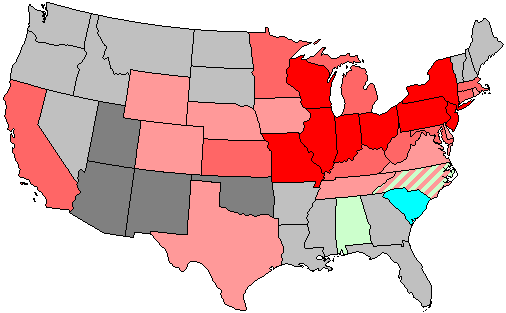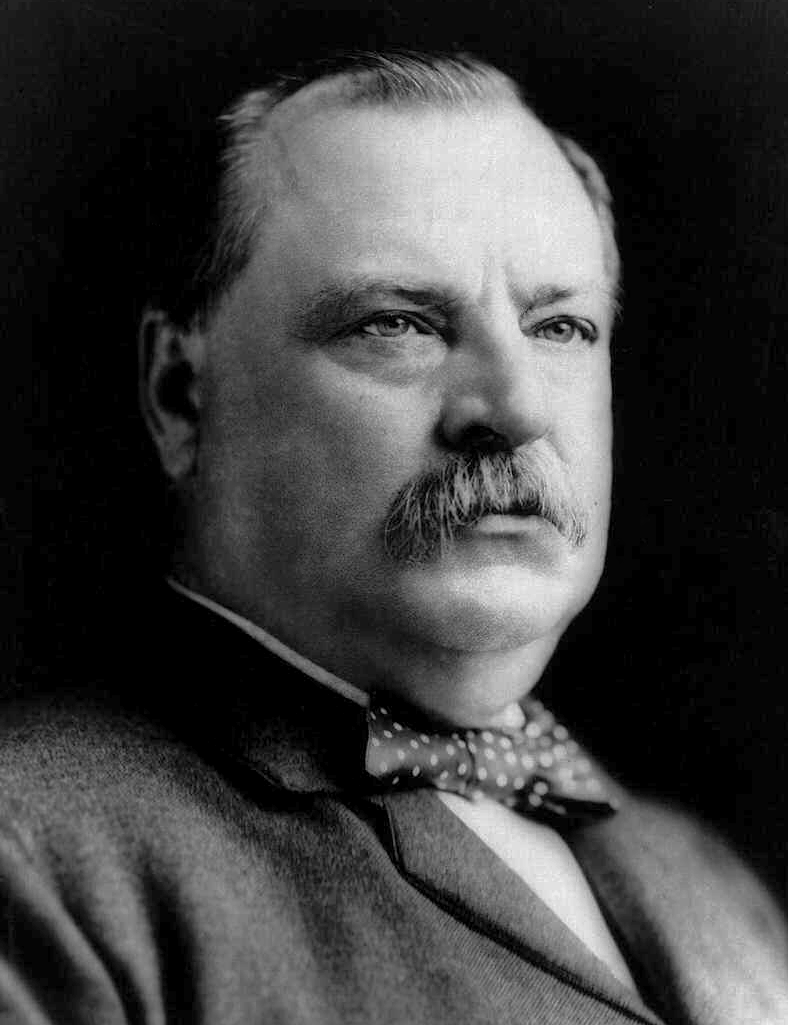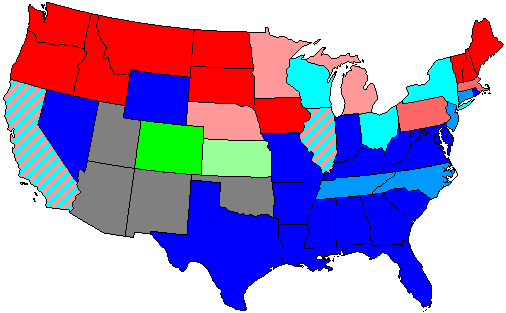|
United States Elections, 1894
The 1894 United States elections was held on November 6, and elected the members of the 54th United States Congress. These were mid-term elections during Democratic President Grover Cleveland's second term. The Republican landslide of 1894 marked a realigning election In American politics as the nation moved from the Third Party System that had focused on issues of civil war and reconstruction, and entered the Fourth Party System, known as the Progressive Era, which focused on middle class reforms. The Democrats suffered a landslide defeat in the House losing over 100 seats to the Republicans in the single largest swing in the history of the House. The Democrats also lost four seats in the Senate, thus resulting in the President's party completely losing control of both houses of Congress, the first time this ever happened in a midterm election. The Democratic Party losses can be traced largely to the Panic of 1893 and the ineffective party leadership of Cleveland. Republican ... [...More Info...] [...Related Items...] OR: [Wikipedia] [Google] [Baidu] |
United States Midterm Election
Midterm elections in the United States are the Elections in the United States, general elections that are held near the midpoint of a President of the United States, president's four-year term of office, on Election Day (United States), Election Day on the Tuesday after the first Monday in November. Federal offices that are up for election during the midterms include all 435 seats in the United States House of Representatives, and 33 or 34 of the 100 seats in the United States Senate. In addition, 34 of the 50 U.S. states elect their Governor (United States), governors for four-year terms during midterm elections, while Vermont and New Hampshire elect governors to two-year terms in both midterm and presidential elections. Thus, 36 governors are elected during midterm elections. Many states also elect officers to their State legislature (United States), state legislatures in midterm years. There are also elections held at the municipal level. On the ballot are many mayors, oth ... [...More Info...] [...Related Items...] OR: [Wikipedia] [Google] [Baidu] |
Bourbon Democrat
Bourbon Democrat was a term used in the United States in the later 19th century (1872–1904) to refer to members of the Democratic Party who were ideologically aligned with fiscal conservatism or classical liberalism, especially those who supported presidential candidates Charles O'Conor in 1872, Samuel J. Tilden in 1876, President Grover Cleveland in 1884, 1888, and 1892 and Alton B. Parker in 1904. After 1904, the Bourbons faded away. Southerner Woodrow Wilson made a deal in 1912 with the leading opponent of the Bourbons, William Jennings Bryan: Bryan endorsed Wilson for the Democratic nomination and Wilson named Bryan Secretary of State. Bourbon Democrats were promoters of a form of ''laissez-faire'' capitalism which included opposition to the high-tariff protectionism that the Republicans were then advocating as well as fiscal discipline. They represented business interests, generally supporting the goals of banking and railroads, but opposed to subsidies for them and were ... [...More Info...] [...Related Items...] OR: [Wikipedia] [Google] [Baidu] |
General Elections In The United States
A general officer is an officer of high rank in the armies, and in some nations' air forces, space forces, and marines or naval infantry. In some usages the term "general officer" refers to a rank above colonel."general, adj. and n.". OED Online. March 2021. Oxford University Press. https://www.oed.com/view/Entry/77489?rskey=dCKrg4&result=1 (accessed May 11, 2021) The term ''general'' is used in two ways: as the generic title for all grades of general officer and as a specific rank. It originates in the 16th century, as a shortening of ''captain general'', which rank was taken from Middle French ''capitaine général''. The adjective ''general'' had been affixed to officer designations since the late medieval period to indicate relative superiority or an extended jurisdiction. Today, the title of ''general'' is known in some countries as a four-star rank. However, different countries use different systems of stars or other insignia for senior ranks. It has a NATO rank sc ... [...More Info...] [...Related Items...] OR: [Wikipedia] [Google] [Baidu] |
1894 Elections In The United States
Events January–March * January 4 – A military alliance is established between the French Third Republic and the Russian Empire. * January 7 – William Kennedy Dickson receives a patent for motion picture film in the United States. * January 9 – New England Telephone and Telegraph installs the first battery-operated telephone switchboard, in Lexington, Massachusetts. * February 12 ** French anarchist Émile Henry sets off a bomb in a Paris café, killing one person and wounding twenty. ** The barque ''Elisabeth Rickmers'' of Bremerhaven is wrecked at Haurvig, Denmark, but all crew and passengers are saved. * February 15 ** In Korea, peasant unrest erupts in the Donghak Peasant Revolution, a massive revolt of followers of the Donghak movement. Both China and Japan send military forces, claiming to come to the ruling Joseon dynasty government's aid. ** At 04:51 GMT, French anarchist Martial Bourdin dies of an accidental detonation of his own bomb, next ... [...More Info...] [...Related Items...] OR: [Wikipedia] [Google] [Baidu] |
1892–93 United States Senate Elections
The 1892–93 United States Senate elections were held on various dates in various states, coinciding with former Democratic President Grover Cleveland's return to power. As these U.S. Senate elections were prior to the ratification of the Seventeenth Amendment in 1913, senators were chosen by state legislatures. Senators were elected over a wide range of time throughout 1892 and 1893, and a seat may have been filled months late or remained vacant due to legislative deadlock. In these elections, terms were up for the senators in Class 1. The Republican Party lost nine seats, losing its majority to the Democratic Party. The Democratic majority, however, was minimal and did not last past the next Congress. Results summary Senate party division, 53rd Congress (1893–1895) * Majority party: Democratic (43) * Minority party: Republican (37) * Other parties: Populist (3); Silver (1) * Vacant: 4 * Total seats: 88 Change in Senate composition Before the elections Res ... [...More Info...] [...Related Items...] OR: [Wikipedia] [Google] [Baidu] |
1892 United States House Of Representatives Elections
The 1892 United States House of Representatives elections, coincided with the election of Grover Cleveland as president for the second, non-continuous, time, defeating incumbent Benjamin Harrison. In spite of the presidential results, Harrison's Republican Party gained back some of the seats that had been lost in 1890 to the Democratic Party, but was still deep in the minority. The Republican pickups were a result of a number of Republican-friendly Northern districts reverting to form after voting Democratic in the previous election cycle. The third party Populists, who had high support among farmers and laborers in the South and West, also gained three seats. Election summaries This was the first election after reapportionment following the 1890 Census. Twenty-four new seats were added, with 13 States gaining one seat each, two States gaining 2 seats each, and one state gaining 3 seats, and the remaining 28 states having no change. Several states did not redistrict following ... [...More Info...] [...Related Items...] OR: [Wikipedia] [Google] [Baidu] |
1892 United States Presidential Election
The 1892 United States presidential election was the 27th quadrennial presidential election, held on Tuesday, November 8, 1892. In a rematch of the closely contested 1888 presidential election, former Democratic President Grover Cleveland defeated incumbent Republican President Benjamin Harrison. Cleveland's victory made him the first and, to date, the only person in American history to be elected to a non-consecutive second presidential term. It was also the first time incumbents were defeated in consecutive elections—the second being Jimmy Carter's defeat of Gerald Ford in 1976, followed by Carter's subsequent loss to Ronald Reagan in 1980. Additionally, Harrison's loss marked the second time an elected president lost the popular vote twice, the first being John Quincy Adams in the 1820s. This feat was not repeated until Donald Trump lost the popular vote in 2016 and 2020. Though some Republicans opposed Harrison's re-nomination, Harrison defeated James G. Blaine and Wil ... [...More Info...] [...Related Items...] OR: [Wikipedia] [Google] [Baidu] |
1894 Pennsylvania Gubernatorial Election
The 1894 Pennsylvania gubernatorial election occurred on November 6, 1894. Republican candidate Daniel H. Hastings defeated Democratic candidate William M. Singerly to become Governor of Pennsylvania. Results References 1894 Pennsylvania Gubernatorial A governor is an administrative leader and head of a polity or political region, ranking under the head of state and in some cases, such as governors-general, as the head of state's official representative. Depending on the type of political ... November 1894 events {{Pennsylvania-election-stub ... [...More Info...] [...Related Items...] OR: [Wikipedia] [Google] [Baidu] |
1894 South Carolina Gubernatorial Election
The 1894 South Carolina gubernatorial election was held on November 6, 1894 to select the governor of the state of South Carolina. John Gary Evans was nominated by the Democrats and became the 85th governor of South Carolina. Democratic campaign The conservatives had been so thoroughly defeated by Ben Tillman in 1890 and 1892 that they did not offer a candidate for the gubernatorial election. Instead, it became a contest between four Tillmanites: William Ellerbe, John Gary Evans, Dr. Sampson Pope and J.E. Tindal. All four claimed to be ''the'' candidate favored by Tillman, but an embarrassed Tillman responded, "They ought to be spanked for quarrelling about who is the closest friend of Tillman." Initially, Tillman privately supported Ellerbe because he was a farmer, but Tillman became more attracted to Evans as he proved to be a better orator during the campaign. Evans also was able to woo Senator Irby to his side, who placed the Tillman machine squarely behind his candidac ... [...More Info...] [...Related Items...] OR: [Wikipedia] [Google] [Baidu] |
1894–95 United States Senate Elections
The 1894–95 United States Senate elections were held on various dates in various states. As these U.S. Senate elections were prior to the ratification of the Seventeenth Amendment in 1913, senators were chosen by state legislatures. Senators were elected over a wide range of time throughout 1894 and 1895, and a seat may have been filled months late or remained vacant due to legislative deadlock. In these elections, terms were up for the senators in Class 2. The Republican Party gained plurality control of the Senate with Populist Party and Silver Party support. Results summary Senate party division, 54th Congress (1895–1897) * Plurality: Republican: 42 * Minority: Democrats: 39 * Other parties: Populist: 4, Silver: 2 * Total: 88 * Vacant: 1, due to failure to elect. Later filled by a Democrat Change in composition Before the elections At the beginning of 1894, including early elections in Mississippi and Virginia. Result of the general elections Result ... [...More Info...] [...Related Items...] OR: [Wikipedia] [Google] [Baidu] |
1894 United States House Of Representatives Elections
The 1894 United States House of Representatives elections were held from June 4, 1894 to November 6, 1894, with special elections throughout the year. Elections were held to elect representatives from all 356 congressional districts across each of the 44 U.S. states at the time, as well as non-voting delegates from the inhabited U.S. territories. The winners of this election served in the 54th Congress, with seats apportioned among the states based on the 1890 United States Census. The elections comprised a significant political realignment, with a major Republican landslide that set the stage for the decisive election of 1896. The 1894 elections came in the middle of Democratic President Grover Cleveland's second term. The nation was in its deepest economic depression yet following the Panic of 1893, which pushed economic issues to the forefront. In the spring, a major coal strike damaged the economy of the Midwest and Mid-Atlantic. It was accompanied by violence; the miners ... [...More Info...] [...Related Items...] OR: [Wikipedia] [Google] [Baidu] |
United States Elections, 1896
The 1896 United States elections elected the 55th United States Congress. Republicans won control of the Presidency and maintained control of both houses of Congress. The election marked the end of the Third Party System and the start of the Fourth Party System, as Republicans would generally dominate politics until the 1930 elections. Political scientists such as V.O. Key, Jr. argue that this election was a realigning election, while James Reichley argues against this idea on the basis that the Republican victory in this election merely continued the party's post-Civil War dominance. The election took place in the aftermath of the Panic of 1893, and featured a fierce debate between advocates of bimetallism (" free silver") and supporters of the gold standard. In the Presidential election, Republican former Governor William McKinley of Ohio defeated Democratic former Representative William Jennings Bryan of Nebraska. McKinley took the Republican nomination on the first ballot ... [...More Info...] [...Related Items...] OR: [Wikipedia] [Google] [Baidu] |







